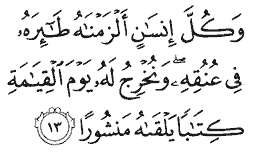Can't Disown Actions, Gather Together, Support All Religions
Issue 633 » May 13, 2011 - Jumada Al-Thani 10, 1432
Living The Quran
Can't Disown Actions
Al-Isra (The Night Journey) - Chapter 17: Verse 13
 "Every human being's action have We tied around his own neck. On the Day of Resurrection We shall produce for him a record which he will find wide open."
"Every human being's action have We tied around his own neck. On the Day of Resurrection We shall produce for him a record which he will find wide open."
The Arabic phraseology of this verse provides a highly graphic description which uses the word, 'bird', in place of 'action', as used in the translated text. Thus we have here a metaphor referring to what flies of a person's actions and becomes tied around his neck, so that it never parts from him.
A person's actions do not leave him, and he cannot disown them. The same applies to the wide open record of all his actions. Thus whatever he has done in life is laid bare. He cannot hide, ignore or disown it. Both descriptions of the bird denoting action and the record thrown open produce a very strong effect that adds to the fears experienced on that very difficult day when nothing remains hidden.
The causes that lead us to ultimate salvation, to our perpetual happiness or unending misery, lie within ourselves. It is the proper use of our natural faculties, our power of judgment and decision, our preference and choice which makes us earn either happiness or misery.
People who do not understand things properly hold external factors to be responsible for their fortune. If people were to critically examine themselves, they would appreciate that the factors which had put them on the road to their destruction and ultimately led to their undoing lay within themselves - their own bad character traits and bad decisions. Their destruction was not thrust upon them by outside factors.
Compiled From:
"In The Shade of The Quran" - Sayyid Qutb, Vol. 11, p. 140
"Towards Understanding the Quran" - Sayyid Abul Ala Mawdudi, vol. 5, p. 29
Understanding The Prophet's Life
Gather Together
To believe, along with the recollection of the presence of the Creator, is a way of understanding one's life within Creation and among people, for, from the Islamic point of view, to be with God is to be with human beings. By trying to excel in the practice of their religion, Muslims are immediately called to face the communal dimension of Islamic way of life.
To pronounce the shahada is to share in the community spirit with its immediate implication, which is the promotion of social activities. Prayer establishes connections with our Muslim neighbour in a specific place, while zakat enlarges the circle of our social relations, for the whole of the sum must be spent on the needy people in the area where it is raised. Fasting develops an even broader feeling, for by fasting and by thinking about it, we are in spiritual communion with the poor of the whole world. And this communion finds a final, tangible, and physical realization in the pilgrimage to Mecca.
In philosophical terms, one might say that this feeling has a part in Muslim identity at the heart of the practice and that it constitutes one of the distinctive characteristics of such an identity. As the Prophet said: "Gather together, for the wolf picks off only the sheep that stand alone." [Ahmad, Abu Dawud]
Compiled From:
"Western Muslims and The Future of Islam" - Tariq Ramadan, pp. 86-89
Blindspot!
Support All Religions
An Islamic government is charged with supporting all religions equally. It is a twist on the American ideal of separation of church and state, which forbids government from having any role in religion. In contrast, Islam says the state must support all religions! The Islamic government is forbidden to seize the churches, synagogues, or temples of any group, nor can the government meddle in the appointment of religious leaders by each group. The treaty Prophet Muhammad, peace be upon him, made with a local Christian community is very clear: No bishop can be removed from his office and no church can be confiscated.
From the time of Prophet Muhammad through the last Muslim Empire of the Ottomans Muslim rulers have been particularly concerned with the welfare of their non-Muslim subjects and their religious needs. For example, in the year 1076, the Muslim ruler of Bejaya, in present-day Algeria, wrote to Pope Gregory VII about the desire of the Christians in his land for a certain priest to be promoted to bishop. The pope was so overjoyed at this expression of religious respect that he wrote a beautiful letter in response, which concluded with the words: "We pray with heart and mouth that, after a long sojourn in this life, the same God may guide you to the bosom of happiness of the holy patriarch Abraham."
Has Muslim history had its share of despots and kings? Sure it has, but so has the Christian world. What is to be judged are the principles and not how faithfully they are applied.
Compiled From:
"The Complete Idiot's Guide to Understanding Islam, 2nd Edition" - Yahiya Emerick, pp. 231, 232